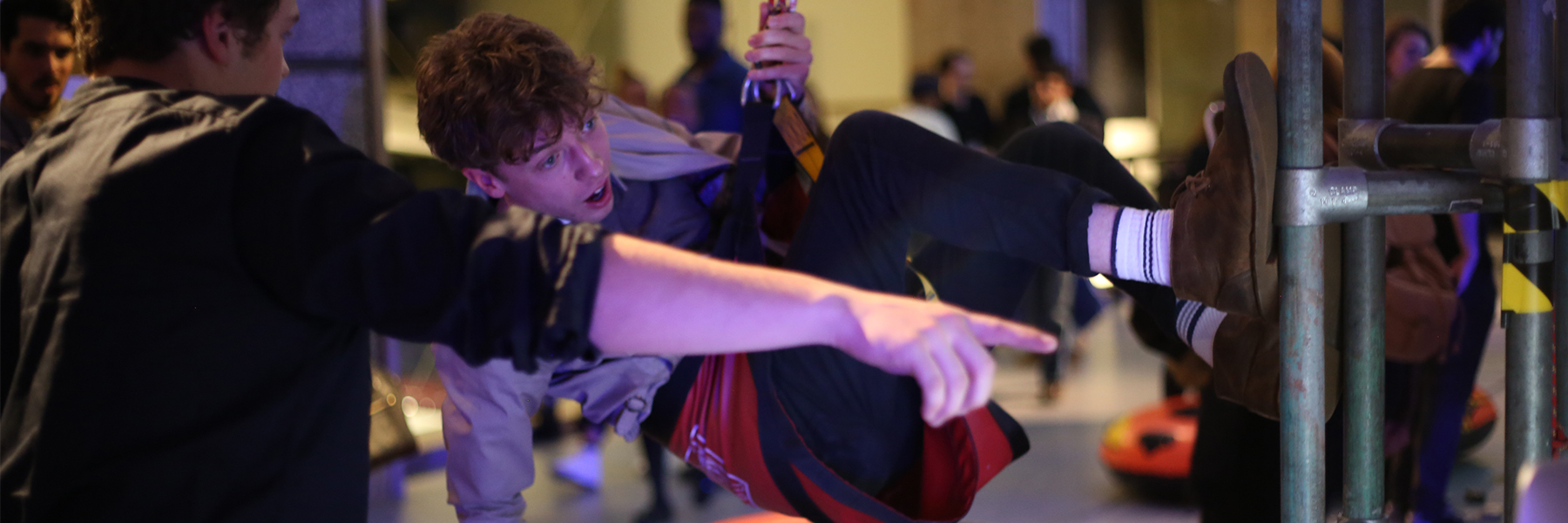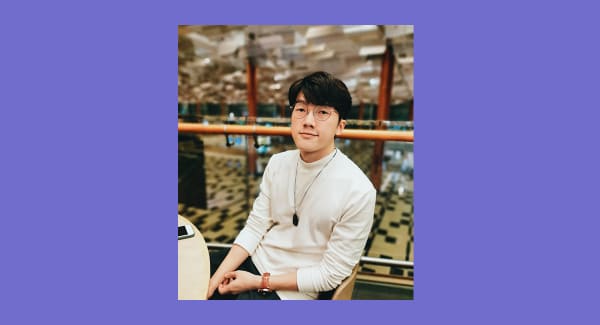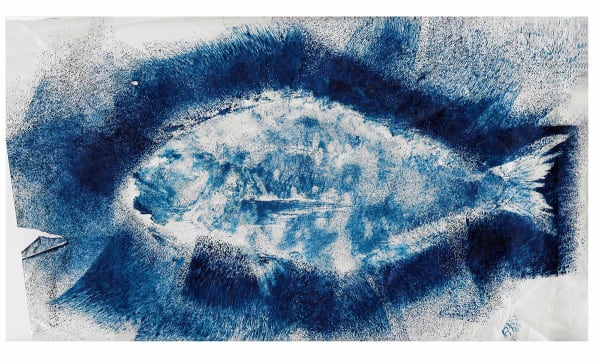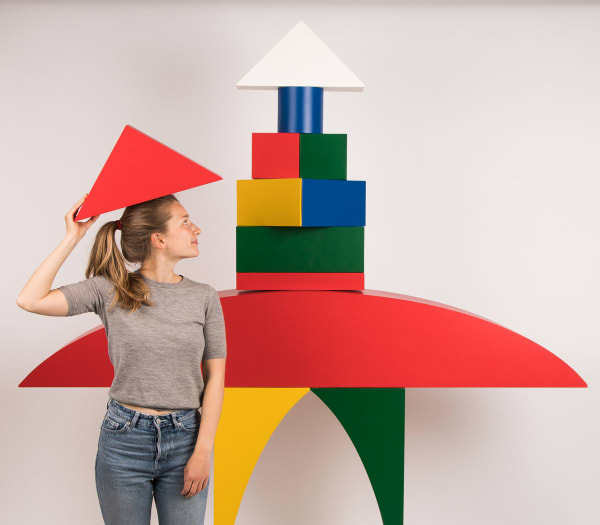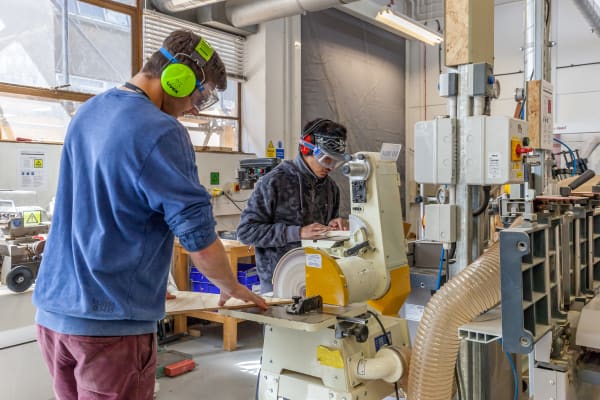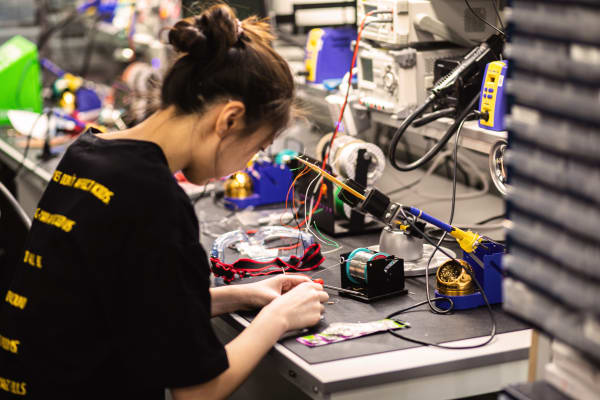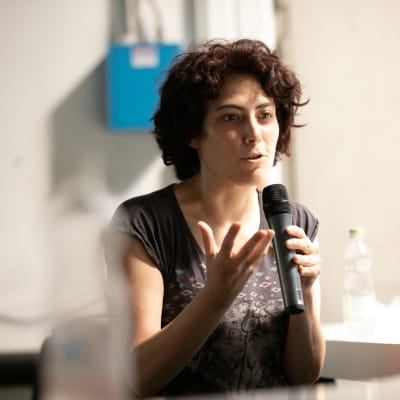Course units
We are committed to ensuring that your skills are set within an ethical framework, and we have worked to embed UAL’s Principles for Climate, Racial and Social Justice Principles into the curriculum and in everything we do.
As part of this initiative, we’ve shaped our courses around social and environmental sustainability principles that ensure learning outcomes reflect the urgent need to equip you with the understanding, skills, and values to foster a more sustainable planet. Our aim is to change the way our students think, and to empower you to work towards a sustainable future.
In common with all courses at the University of the Arts London, this course is credit rated. The course is 3 years, levels 4-6. Each year requires you to achieve 120 credit points. To be awarded the BA (Hons) Interaction Design Arts qualification, you need to accumulate a total of 360 credits.
Year 1
Exploration and Play (40 credits) (Unit 1A)
Focuses on learning and discovery through practical activities and projects. It introduces core design principles and explores play as a method of research, experimentation and design.
Introduction to Interaction Design Arts (20 credits) (Unit 1B)
Through academic reflection, writing and practical workshops, this unit will equip you with essential skills that will give you the confidence to navigate through the course and College and to help you begin to develop a personal approach to your work.
High Tech, Low Tech, No Tech (40 credits) (Unit 2A)
Introduces you to design through materials, prototypes and diegetics. This media-agnostic unit invites you to consider technologically and materially appropriate design solutions to studio projects, situating it within wider theoretical and practical context.
Responsible Design (20 credits) (Unit 2B)
The Unit provides an introduction to core principles in responsible design where you will explore the role of environmental and social responsibility across multiple design subject specialisms to inform and further develop your own creative practice. You will engage in contemporary debates and explore approaches, tools and frameworks for understanding and practising how social and environmental responsibility is enacted across visual communication practices from within organisational structures, to the design of digital and analogue products, services, and images.
Year 2
Desire Lines and Affordance (40 credits) (Unit 3A)
This unit is intensive and designed to introduce you to subject specific processes and techniques involved in interaction and design. It deals with design in the lived environment; how people and users interact with the world around them and encourages you to reach beyond the studio for research and inspiration.
Professional Practices (20 credits) (Unit 3B)
This unit seeks to extend your knowledge of the creative, cultural and design industries, providing you with opportunities to work on live project as you continue to develop your design practice in mixed-discipline and collaborative teams.
Expanded Cinema and Physical Computing (40 credits) (Unit 4A)
This unit is designed to further aid and develop the work and concepts introduced in previous units. The unit encourages you to experiment with traditional and new media technologies. The unit is also highly spatial and technical, looking at programming, sensors and computing in a real-world context.
Design Cultures (20 credits) (Unit 4B)
In this unit, you will explore a thematic area of your choice within Design Cultures, questioning established narratives and developing your critical voice. You will explore knowledge at the boundary of your design discipline, evaluating diverse ideas and practices in in relation to your chosen thematic area.
Year 3
Self-Initiated Research Project (40 credits) (Unit 5A)
This unit gives you an opportunity to engage with an in-depth research project on a topic of your choice. You will bring together the skills, knowledge and experience you have developed during your study to carry out an extended research project that connects theory and practice.
Minor Studio Project (20 credits) (Unit 5B)
The Minor Studio Project is self-initiated; emphasising research and the identification of appropriate intellectual and practical methodologies to support your outcomes.
Major Studio Project (60 credits) (Unit 6)
The Major Studio Project is undertaken by all third-year students and generally consists of three individual briefs, which you chose. It is the culmination of the course and provides you with the opportunity to utilise all of your practical, critical and analytical skills in the realisation of projects related to the development of your individual portfolio.
Optional Diploma between Years 2 and 3
Between Years 2 and 3 of your course, you will also have the opportunity to undertake one of the following qualifications:
Diploma in Professional Studies (DPS) (Optional)
An optional, year-long learning opportunity which enables you to develop your professional skills by undertaking time out for industry experience. Supported throughout the year by academics, you’ll build on the knowledge gained on your course in a range of national or international locations, and graduate with an additional qualification of Diploma in Professional Studies.
Diploma in Creative Computing (Optional)
Between Years 2 and 3, you can undertake the year-long Diploma in Creative Computing. This will develop your skills in creative computing alongside your degree. After successfully completing the diploma and your undergraduate degree, you’ll graduate with an enhanced degree: BA (Hons) Interaction Design Arts (with Creative Computing).
